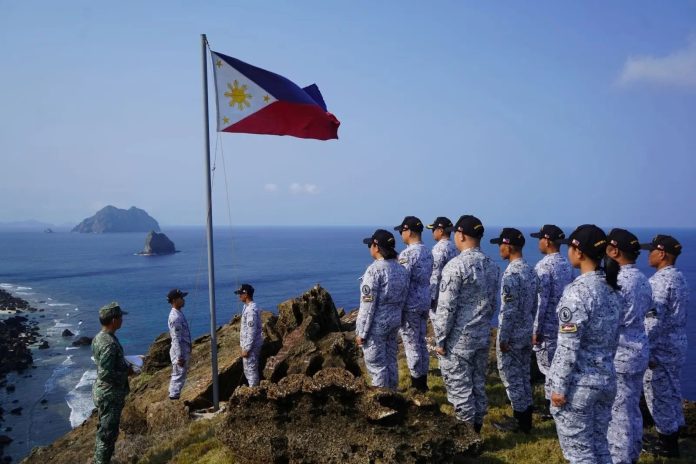As tensions continue to escalate between China and the Philippines over disputed territory in the South China Sea, Manila has devised a different plan to counter China. Interestingly, it centers around Beijing’s kryptonite: Taiwan
To strengthen the country’s territorial defense, Filipino Defense Secretary Gilberto Teodoro directed the military to increase the number of troops stationed at the northernmost island, specifically the remote Batanes Island. During his recent visit to the naval installations, he also called for the development of more infrastructure on the island.
But here is a catch: the Batanes Islands are located just 200 kilometers (125 miles) from Taiwan, a self-ruled island state that China considers its renegade province and wants to occupy. The announcement made by the Filipino Defense Secretary comes at a time when China and the Philippines have been locking horns in the South China Sea.
The long-standing territorial disputes between the two countries have triggered confrontations between their Coast Guard Ships, with fears of a potential Chinese invasion of the Second Thomas Shoal looming large over Manila.
Chinese vessels regularly attempt to prevent Filipino vessels from replenishing their troops aboard the Sierra Madre warship, which was deliberately run aground several years ago and functions as a temporary Filipino outpost at the disputed shoal.
After several months of confrontation at sea and bombast by Chinese authorities, the Philippines is looking to bolster its military capability and strengthen its territorial defenses.
The decision to boost troops and expand infrastructure at Batanes Islands seems to be a part of that ambitious strategy. The Bashi Channel, which runs between Batanes and Taiwan, is a crucial choke point for ships traveling between the western Pacific and the disputed South China Sea and is likely to be used by China in case of hostilities.
“The visit highlights the importance of fortifying our territorial defense capabilities to ensure our nation’s overall safety and integrity,” read the military statement. “To protect stakeholders such as fishermen and other maritime-related agencies for them to feel safer.” Teodoro also asked for enhanced collaboration between local government units and the military.
The Philippine Navy opened its naval detachment on Mavulis Island in Batanes in October 2023. This area is also reportedly considered a potential location for this year’s annual US-Philippines military exercises.
A month later, the Philippines and the United States started joint patrols on Mavulis island, located 100 kilometers from Taiwan, and ended in the South China Sea.
The United States was also granted access to a tiny island portion of the Philippines in the Cagayan region as part of the Enhanced Defense Cooperation Agreement (EDCA). Located just 250 miles or 400 kilometers south of Taiwan, Fuga Island could potentially be used to harass the southern flank in case of a Chinese naval attack on Taiwan.
Additionally, it could be used by the United States for launching operations against China as it lies adjacent to two key passages – the Luzon Strait and the Bashi Channel – which provide access to the South China Sea and the Pacific. Reports have indicated that the US may consider building a civilian port on the Batanes islands.
In 2022, a former Filipino official hinted that his country would assist the US in repelling a Chinese invasion of Taiwan based on the threat it poses to Manila. The Marcos Jr administration, on its part, has made no such official comments and maintains the access given to the US is based on a long-standing mutual defense pact.
The Philippines has been seen making apparent overtures to Taiwan. For instance, Filipino President Ferdinand Marcos sent Taiwanese President-elect Lai Ching-te a congratulatory note on his victory last month. Angered by the gesture, China summoned the Philippines’ ambassador to lodge its protest against the move.
Philippines-based military analyst Miguel Miranda told EurAsian Times, “The Batanes region is a cluster of atolls and islets along the strategic Luzon Strait, a maritime passage and a vital conduit for undersea fiber optic cables.
“Unfortunately, it’s also a crossing point for the Chinese navy when they hold large-scale drills to intimidate Taiwan. In the event of open hostilities between China and Taiwan, there’s no doubt large naval forces will either try to travel or even launch combat operations in and around the Luzon Strait. Your readers can guess how this will be received in Manila.”
Although the Marcos administration has not explicitly stated how boosting the defense of Batanes will help its security, its National Security Policy 2023 to 2028, adopted in August last year, warned that the tensions in the Taiwan Strait could end up affecting the country.
The document said in very unambiguous terms that “any military conflict in the Taiwan Strait would inevitably affect the Philippines, given the geographic proximity to Taiwan and the presence of 150,000 Filipinos in Taiwan.”
This is also why another regional power, Japan, strengthened defense ties with Taiwan. Japan’s geographical closeness to Taiwan is predicted to drag Japan into a cross-strait conflict, which might also see the participation of the United States.
Japan Is Seeking Closer Ties With Taiwan
Prime Minister Fumio Kishida said at a meeting with Taiwan’s envoy at the APEC international gathering in November last year that Japan wishes to strengthen cooperation and exchanges with the island nation. He also stressed that it was imperative to find a peaceful resolution to issues related to the Taiwan Strait, a reference to tensions with China.
“Taiwan is a vital partner and good friend that shares fundamental values, and has close economic ties and people-to-people exchanges” with Japan, the Japanese Foreign Ministry quoted Kishida as saying.
Analysts believe that Taiwan and the United States greatly benefit from Japan’s policies. Under the 1979 Taiwan Relations Act, the United States government maintains a “robust unofficial relationship” with Taiwan and views “any effort to determine the future of Taiwan by other than peaceful means as a threat to the peace and security of the Western Pacific area and of grave concern.”
Concern that Beijing would use its military to compel unification with democratic Taiwan has grown in recent months, especially in the United States. The Biden administration went so far as to say that it would assist Taiwan militarily in case of a Chinese invasion.
If an invasion is launched and the US intervenes, Japan will likely get dragged along. The distance between Taiwan’s east coast and the westernmost island of Japan is less than 100 miles. Although informal, Taipei and Tokyo have long had close relationships that continue to grow.
Additionally, the US maintains a sizable military presence in Japan as part of a robust security partnership. Analysts predict that if the United States chose to defend Taiwan, it would primarily rely on American troops and equipment and look to Japan for assistance.
Although Japan’s official policy on Taiwan is still ambiguous, a policy shift has been observed in recent months as tensions with China over the disputed Senkaku Island continue to grow. In September, for instance, Japan riled up China as it appointed a serving government official to act as its de facto defense attache in Taiwan.
On February 7, 2024, Tokyo Governor Yuriko Koike visited Taipei for the first time since assuming office in 2016. On the visit, the governor met with Taipei Mayor Chiang Wan-an to establish cooperation in civilian areas. The visit, however, ended up antagonizing China.
Until this decision was taken, Japan managed bilateral ties through the Japan-Taiwan Exchange Association in Taipei, manned mainly by officials from its commerce and foreign ministries. The position of defense attaché was, until now, filled by a retired Japanese Defence Force officer to avoid hostilities with China.
The decision was seen as “symbolic” of Japan’s backing of Taiwan. “Taiwan had been asking for an active duty defense official to fill the post,” an informed source told media.
While Japan has yet to have any formal defense transactions with Taiwan, it has been swiftly strengthening defense cooperation with the Philippines, which is believed to be aimed at assisting Manila in securing sea approaches and safeguarding the self-ruled, beleaguered island.

































